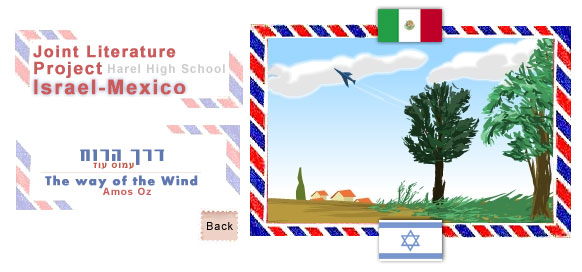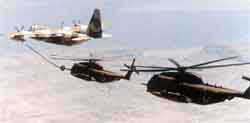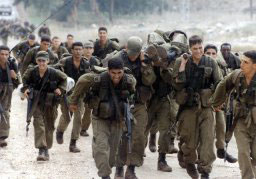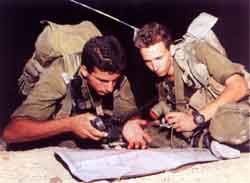|
|
||||||
|
|
||||||
|
The Mission | Historical Background | The Road to peace | The Army of the People
|
||||||
|
Defense Forces
To protect the inhabitants of Israel and to combat all forms of terrorism which threaten daily life. Defense Goal and Policy The State of Israel has always and a single defense goal - to ensure the existence of israel and the security of its citizens. Israel's defense policy has been, therefore, to maintain a strong deterrent capacity to dissuade potential enemies from attacking, Defense Strategy Israel's security doctrine dictates that Israel cannot lose a single war. If war breaks out, Israel must defeat the enemy quickly and decisively. Since it lacks strategic depth, Israel must prevent the enemy from entering its territory, and must try to quickly transfer the battle to enemy territory. Basic Defense Problems and Solutions
There has always been a basic asymmetry between Israel and its Arab neighbors.Israel covers a tiny area on the map compared with its neighbors. Israel's population is also very small so it has never been able to amass a large army, certainly nothing near the size of that of a large Arab state. equipped to cope with immediate security needs.It relies heavily on its reserve forces and in time of war, most of the population is called up. To make up for this quantitative disadvantage, it is essential that Israel maintain as large a qualitative lead as possible. The IDF makes up for its lack of size by superior maneuverability and fire power, and by relying on intelligence. Main Areas
of activity
Israel can only maintain a standing force The IDF concetrates its main efforts in these areas:
Through War and Peace The IDF was formed in the throes of war with the establishment of the state half a century ago. And in the course of its short fifty years, Israel was forced into wars most reckoned it could not survive. But the IDF came out victorious. It fought boldly against Arab armies who wanted to destroy the state, and won against overwhelming odds. Born in battle, the Israel Defense Forces had to face the greatest challenges to defend israel against large Arab armies which sought to destroy the Jewish state 1948
1956 Sinai Campaign. Israel tries to put an end to repeated terrorist incursions from Egypt and lift the Egyptian blockade on Eilat. 1967 Six Day War. Arab armies, led by Egypt mass their troops on Israel's borders. Israel preempts an Arab offensive with a well-orchestrated attack against Arab air forces. In a war fought only six days on three fronts, against Egypt, Jordan and Syria, Israel succeeds in capturing the West Bank, Sinai, the Golan Heights, and unifies its capital, Jerusalem. 1968-71
1973 Yom Kipur War. A surprise attack by Egypt and Syria on the holiest day of the jewish year. The IDF is initially taken by surprise but eventually manages to turn the tide, with Israeli troops advancing past the Suez Canal into Egypt and nearing Damascus in Syria. 1976 Operation Jonathan, the
Entebbe Rescue Operation. In this daring act against terrorism, IDF
commandos fly to Uganda and rescue over a 100 hostages held on a plane
hijacked to this distant African country.
1978 Operation Litani. An anti-terrorist operation into Lebanon after terrorists kill 37 civilians on the coastal road near Tel Aviv. 1979 Peace with Egypt. Egyptian President Anwar Sadat becomes the first leader of an Arab state to make peace with Israel. As part of the treaty Israel withdraws from the Sinai. 1981 Destruction of the Iraqi nuclear reactor. With Iraq's programs to develop nuclear arms moving into advanced stages, Israel launches a successful air attacks , destroying the Iraqi Osirak nuclearreactor. 1982 Operation Peace for Galilee.
After repeated terrorist attacks, Israel enters Lebanon to act against PLO
bases. IDF troops reach Beirut and evict the PLO from Lebanon.
1982-85 The IDF gradually withdraws from Lebanon, setting up security zone in southern Lebanon, north of Israel's border. 1987 Beginning of a Palestinian uprising (Intifada) in the Administered Territories. 1991 Gulf War. Iraq fires Scud missles on Israeli cities. This is the first time Israel is faced with the threat of a non-conventinal weapon attack. 1993 Declaration of Principles
with the PLO (Oslo 1). The PLO recognizes Israel's existence and Israel
commits to setting up a Palestinian Authority in the Wst Bank and Gaza.
Operation Accountability. Limited operation in Lebanon against Hizbullah
terrorists to ensure the safety of northern Israel.
1994 Peace treaty with Jordan. Formalization and expansion of unofficial relations which hadexisted between the two countries. The IDF redeploys in Gaza and Jericho. 1995 Interim Agreement with the Palestinians (Oslo 2). The IDF moves out of six cities and populated Arab areas in the West Bank. 1996 Operation Grapes of Wrath. Another operation against Hizbullah terrorists in Lebanon after repeated Katyusha rocket firing into the north of Israel. 1996 Flare-up in the territories. Palestinian Police join rioters and fire on Israeli troops. 1997 Redeployment in Hebron. (in the context of Oslo 2).
The Non-Conventional Threat Today Israel faces a growing threat from peripheral states in the Middle East, such as Iraq, Iran and Libya, which are acquiring conventional and non-conventional weapons of mass destruction with long-range capabilities. Syria too is developing its missile program and arming itself with conventional and non-conventional weapons. The Menace from the North
Fighting Terrorism Terrorism is recognized worldwide as a strategic and global threat, with nations around the world joining together in the war against terror. The IDF has accepted the fact that one of its main tasks for the future is fighting insurgency and terrorism. Israel today is faced with terrorism by Islamic fundamentalist groups - Hizbullah in southern Lebanon and Hamas in the territories. In the recent years terrorism by these groups has increased and has taken a heavier toll. In 1996 an inter-agency committee was set up in the Prime Minister's Office to coordinate anti-terrorist activities. The Homefront
Missle Defense Another lesson of the Gulf War was the need to develop a national missle defense system. Israel is now developing the Arrow missle which is designed to intercept and destroy incoming missles in mid-air. The project, supported by the United States, is at the forefront of missile defense technology and will be operational before the year 2000. Israel is also developing other missile defense systems including the Nautilus - a laser system which will destroy incoming katyusha rockets - and the Boost Phase Intercept. Command, Control,
Communications and Intelligence
Modern warfare has become increasingly linked to hi-tech, and Israel is a world leader in the field. The IDF's qualitative edge has always been supported by extensive investment in research and development. The IDF works hand in hand with Israel's defense industries to develop custom-made weapons systems to meet Israel's needs. Advanced defense technology enables Israel to control large-scale forces on an integrated battlefield and to obtain real-time pictures of enemy deployments. The IDF is improving its intelligence and early warning capabilities. The IDF now obtains advanced satellite information to detect missle launches and has developed its own tactical intelligence by using unmanned air vehicles and more sophisticated radar. Accuracy and Range
Israel is constantly increasing its operational range. The Israel Air Force is acquiring the F-15I, the world's leading fighter aircraft, with increased range and better night and all-weather capabilities. The newly acquired Blackhawk helicopter is also the most advanced of its kind, offering enhanced maneuverability and survivability. Manpower Perhaps the greatest advantage the IDF possesses is its manpower. It is the men and women in uniform who put to maximal use Israel's high technology, and it is they, with their sense of duty, commitment and motivation, who make the IDF the army that it is.
产后如何丰胸效果最好丰胸食物?分享这几个方法。产后由于身材和激素的变化产后丰胸方法,胸部也会有所变化,而产后是胸部二次发育的时机燕窝酒酿蛋,那么你知道要如何丰胸效果比较好呢?接下来小编就给大家分享几个方法吧丰胸产品。
|
||||||

 To defend the existence and territorial sovereignty of the state of
Israel.
To defend the existence and territorial sovereignty of the state of
Israel. 

 War of Independence. The day after the State of Israel was declared, five
Arab armies advanced on the new state. The IDF is established and the
whole of Israel is mobilized as the country fights for its existence.
Israel repels the attack and a cease-fire is reached in 1949.
War of Independence. The day after the State of Israel was declared, five
Arab armies advanced on the new state. The IDF is established and the
whole of Israel is mobilized as the country fights for its existence.
Israel repels the attack and a cease-fire is reached in 1949.  War of Attrition. In this three-year long conflict Israel confronts
repeated incursions, guerrila warfare and static artillery from Egypt.
War of Attrition. In this three-year long conflict Israel confronts
repeated incursions, guerrila warfare and static artillery from Egypt.



 Today
Israel faces a different reality, and is presented with new challenges.
Hopefully, Israel is now entering an era of peace with its immediate
neighbors. Israel has signed peace treaties with Egypt and Jordan, is in
the midst of a peace process with the palestinians, and is attempting to
pursue a dialogue with Syria. While peace is the best form of security for
Israel, a strong IDF is essential for securing that peace.
Today
Israel faces a different reality, and is presented with new challenges.
Hopefully, Israel is now entering an era of peace with its immediate
neighbors. Israel has signed peace treaties with Egypt and Jordan, is in
the midst of a peace process with the palestinians, and is attempting to
pursue a dialogue with Syria. While peace is the best form of security for
Israel, a strong IDF is essential for securing that peace.  The IDF continues to find itself embroiled in a day-to-day guerrilla war
north of its border in southern Lebanon. The IDF is fighting the redical
Shiite Hizbullah organization to protect towns and villages in northern
Israel from Katyusha rocket attacks and terrorist infiltrations.
The IDF continues to find itself embroiled in a day-to-day guerrilla war
north of its border in southern Lebanon. The IDF is fighting the redical
Shiite Hizbullah organization to protect towns and villages in northern
Israel from Katyusha rocket attacks and terrorist infiltrations.  Based on the the experience of the Gulf War when Israel's cities were hit
by Iraqi Scud missles, the IDF is focusing its attention on protecting the
civilian population from the threat of missiles and the possibility of a
non-conventional war. The IDF is currently recognizing and strengthening
the civil defense under the Homefront Command to coordinate IDF and
civilian emergency services in time of war. It is also modifying its
doctrine to minimize the danger of a possible non-conventional attack.
Based on the the experience of the Gulf War when Israel's cities were hit
by Iraqi Scud missles, the IDF is focusing its attention on protecting the
civilian population from the threat of missiles and the possibility of a
non-conventional war. The IDF is currently recognizing and strengthening
the civil defense under the Homefront Command to coordinate IDF and
civilian emergency services in time of war. It is also modifying its
doctrine to minimize the danger of a possible non-conventional attack.





